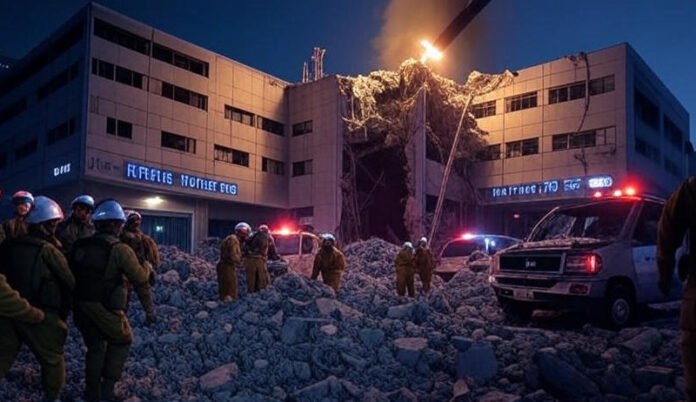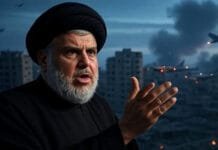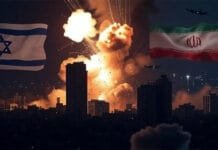
Israel to Escalate Strikes on Iran After Missile Hits Key Hospital
INVC NEWS
Middle East – : The conflict between Israel and Iran surged to a dangerous new level on June 19, after an Iranian missile strike directly hit the Soroka Medical Center in Beersheba, southern Israel. The attack caused significant structural damage to multiple wings of the facility, which serves as the primary trauma center for the Negev region. Emergency response teams quickly evacuated key areas, and while the hospital confirmed extensive damage, no casualties have been reported as of this writing.
According to Iranian military officials, the strike was aimed at what they described as “military and intelligence targets” located near the hospital. However, Israeli authorities dismissed this claim, stating that the hospital itself was the primary target, accusing Tehran of deliberate targeting of civilian infrastructure.
Israel Vows Retaliation: Strategic Targets in Tehran Now in Crosshairs
Shortly after the attack, Israeli Defense Minister Yoav Gallant authorized a major escalation, directing the Israel Defense Forces (IDF) to “intensify strikes on strategic targets in Iran,” specifically focusing on government installations in Tehran and suspected nuclear research facilities. Prime Minister Benjamin Netanyahu issued a national statement, pledging to “exact the full price from Tehran” and ensure that “every inch of Israeli territory is protected.”
The IDF launched a barrage of retaliatory airstrikes in the hours following the hospital attack, targeting sites in Esfahan, Kermanshah, and central Tehran. Satellite imagery and eyewitness accounts confirm that multiple defense compounds, intelligence offices, and missile launch sites were struck.
Trump Issues Ultimatum: Dismantle Nuclear Program or Face Consequences
In a press conference from Mar-a-Lago, former U.S. President Donald Trump revealed that he had sent what he called an “ultimate ultimatum” to Iran’s leadership. According to Trump, the message demanded that Iran completely dismantle its nuclear program or face direct U.S. military intervention. Although he stated that “no final decision” had been made regarding a strike, Trump warned that “all options are on the table.”
The statement has drawn mixed reactions from global leaders. While UK and French diplomats expressed concerns over further escalation, Saudi Arabia and the United Arab Emirates publicly backed Israel’s right to respond to the attack on Soroka Medical Center.
Background: Longstanding Tensions Reignite After Period of Relative Calm
This latest confrontation marks a severe escalation in the already volatile relationship between Iran and Israel, which has been marked by covert operations, cyberattacks, proxy warfare, and assassinations over the past two decades. The strike on a major civilian medical facility, however, represents a new and highly provocative development.
Soroka Medical Center, one of Israel’s largest hospitals, was reportedly not housing any military assets at the time of the strike. Israeli intelligence suggests the attack was a calculated escalation designed to provoke a harsh military response and shift regional attention away from internal unrest in Iran.
Military Analysts Warn of Escalating Theater of War
Defense analysts across the region warn that the situation could spiral into full-scale regional conflict, especially if Israel follows through on its threat to target Iranian nuclear infrastructure. Brig. Gen. (res.) Amos Yadlin, former chief of Israeli Military Intelligence, said, “This is the most dangerous point in Israel-Iran relations since the nuclear talks collapsed. A strike on Iranian soil means direct war—not shadow conflict.”
U.S. intelligence sources confirm that Israel has placed several Iron Dome, David’s Sling, and Arrow missile defense systems on high alert nationwide. The Israeli Air Force has also begun mobilizing reserve squadrons for potential long-range missions.
Regional and Global Reactions: Divided but Alert
Middle East Allies Rally Around Israel
Following the missile strike, leaders from Bahrain, the UAE, and Egypt condemned Iran’s actions and reaffirmed their support for Israel’s right to defend its citizens. The Abraham Accords, signed in 2020, have given Israel a wider base of political support among Sunni Arab nations who view Iran as a mutual threat.
UN and EU Call for De-escalation
The United Nations Security Council held an emergency session late Wednesday, where Secretary-General António Guterres condemned the targeting of civilian infrastructure and called for “immediate cessation of hostilities.” Meanwhile, the European Union urged both sides to “exercise maximum restraint”, warning that continued escalation could destabilize oil markets and global trade routes.
Hospital Strike Draws Sharp Condemnation from International Human Rights Groups
Organizations including Human Rights Watch and Amnesty International issued statements calling the attack on Soroka Medical Center a “clear violation of international humanitarian law.” Both groups are urging the International Criminal Court (ICC) to open a formal investigation into the strike as a possible war crime.
Medical workers at Soroka described the moments following the impact: “There was a loud explosion. The floor shook. Smoke filled the corridors. We rushed patients out of the ICU while sirens kept going,” said one trauma surgeon who wished to remain anonymous.
Nuclear Concerns Resurface Amid Escalation
As tensions rise, so do fears surrounding Iran’s nuclear ambitions. According to recent IAEA intelligence leaks, Iran has enriched uranium to levels just below the threshold for weaponization. A direct strike on Iran’s nuclear infrastructure by Israel could trigger retaliatory strikes on Tel Aviv, Haifa, and Dimona, analysts warn.
Israeli Air Force units have reportedly updated target packages for facilities in Natanz, Arak, and Fordow, should a preemptive strike be greenlit by the Cabinet.
What’s Next: High Alert Across the Region
As of Thursday morning, Israel remains on high alert, with missile sirens sounded in Ashkelon, Dimona, and Jerusalem amid ongoing fears of further attacks. The Israeli Navy has repositioned missile boats along the Mediterranean coast, and combat drones are conducting surveillance along the Syrian and Lebanese borders, anticipating possible Hezbollah retaliation in support of Iran.
Meanwhile, U.S. carrier strike groups in the Persian Gulf are moving closer to the Strait of Hormuz, signaling potential U.S. military support for Israel if Iran chooses to escalate.















